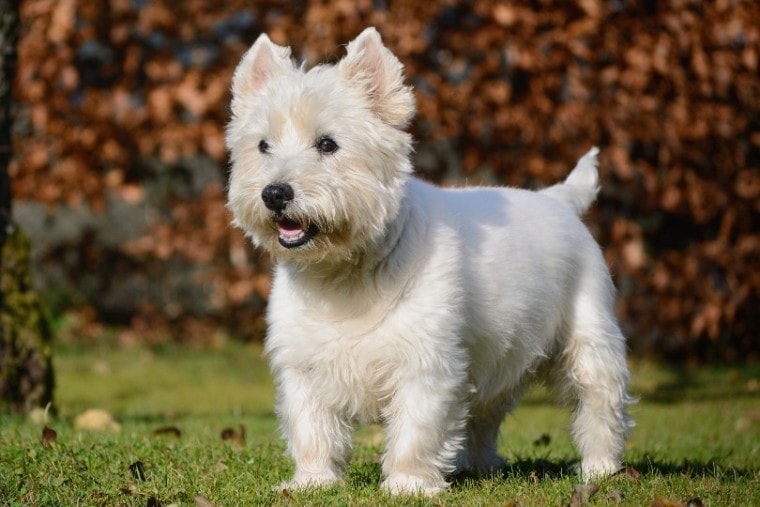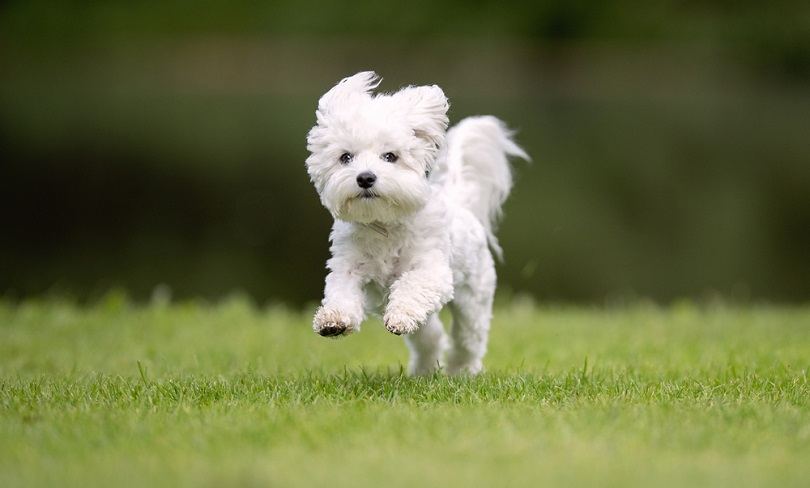
Click Below to Skip Ahead
The West Highland White Terrier is a fun and entertaining dog that likes to be around family members and will usually clown around to get your attention.
Breed Overview
Height:
9.8 – 11 inches
Weight:
15 – 20 pounds
Lifespan:
12 – 17 years
Colors:
White
Suitable for:
Active families, single owners, large and small families
Temperament:
Courageous, self-confident, affectionate, playful
Their small size makes them well suited to apartments and city life, but they also enjoy the space in a large yard. They have a small, compact, surprisingly tough body, and children will love its soft curly fur. If you are thinking about getting one of these dogs for your home but would like to learn more about them, keep reading while we discuss their temperament, diet, grooming, and more to help you make an informed decision.
West Highland White Terrier Characteristics
West Highland White Terrier Puppies

West Highland White Terriers are loving and affectionate small dogs that are great with families or single owners. They love to play and cuddle with their owners. They might not be the easiest dog breed to train, but with positive reinforcement and patience, they can be trainable.
Once you have the dog at home, you will need to purchase food, treats, toys, and other accessories that can add up over time, even with a small dog like the West Highland White Terrier. Be sure to read the West Highland White Terrier’s full care guide so you know what type of food to feed them, how much exercise they need and what grooming sessions will look like for you and your pup.
Temperament & Intelligence of the West Highland White Terrier
West Highland White Terriers are small and friendly dogs that enjoy being around people and have unique personalities that may or may not require time to themselves. They are alert, so they make great watchdogs, but they also like to chase after smaller animals in the yard. They are courageous and fun but also stubborn.
The West Highland White Terrier is an intelligent dog that makes a great companion. It’s smart enough to learn several tricks and is also quite handy at getting itself out of closed doors and over gates into areas it’s not supposed to be, so it can be difficult if you have off-limits places in your home.
Are These Dogs Good for Families? 👪
Yes. The West Highland White Terrier is a great family dog that will usually be there to greet you when you get home and will often sit on the couch with you while you watch television. They get along well with children who are often attracted to their fluffy white coats, as long as they don’t get too rough or pull on the dog’s ears. Its small size is well suited to any living environment in the city or country.
Does This Breed Get Along with Other Pets?
Yes. If you provide your pet with plenty of socialization as a puppy, it can grow to get along well with other household pets. However, we need to point out that this breed has a strong prey drive and will find it difficult to resist chasing smaller animals, including cats, even with plenty of socialization.
Things to Know When Owning a West Highland White Terrier:
Food & Diet Requirements 🦴
The West Highland White Terrier is extremely active and will require a high-quality diet to stay healthy. It’s important to choose a brand that lists real meat like chicken, beef, or turkey as the first ingredient so your pet gets the protein it needs for strong muscles. Protein will also help your pet feel full longer, so it isn’t looking for food. Therefore, we recommend avoiding brands that list corn first as they only tend to put weight on your pet, and some dogs are allergic to artificial colors, and chemical preservatives like BHA and BHT can be dangerous to your pet’s health.
We also recommend choosing brands that provide your pet with omega-three fatty acids, which have numerous health benefits, and probiotics, which can help strengthen your dog’s digestive system. In addition, real fruits and vegetables can be a fantastic source of vitamins and minerals. They are also a great source of prebiotics, which help feed your pets natural probiotics.
- Related Read: Best Dog Foods for West Highland White Terriers
Exercise 🐕
Your West Highland White Terrier is an extremely active dog that will require plenty of exercise to stay happy and healthy. If you have children in the home, they can be a great help because they tend to spend a lot of time playing together, but if there are no children, we highly recommend setting aside at least 30 minutes each day to play games with your pet. Its small size allows you to play games in a small yard or even in a spacious house, and since these dogs have a strong prey drive, they will enjoy chasing after rolling balls and games of hide-and-seek that engage their hunting instincts.

Training 🎾
Unfortunately, the West Highland White Terrier is not one of the easier breeds to train due to its preoccupancy with finding small animals to chase after and inspect what other people in the house are doing. You can improve your chances by holding small 5–10-minute training sessions immediately after your exercising session, so the dog has a chance to burn off some energy and will be better able to focus. Start with simple tricks, like Sit, and provide plenty of positive reinforcement with treats, pets, and praise to keep the dog interested. You will also need plenty of patience as it can take even easier to train dogs several weeks to learn a new trick and commit it to memory.
Grooming ✂️
Your West Highland White Terrier will require a moderate amount of grooming to keep its fluffy fur looking its best. Brushing the coat every few days can help remove loose hair, which might otherwise contribute to mats and tangles. Frequent brushing will also help keep the fur from winding p on your floor or furniture. Many owners choose to have the fur professionally trimmed every six weeks to keep it looking its best. Professional groomers will provide your pet with an even cut that might be difficult, especially for inexperienced owners.
Besides regular brushing, we also recommend manually brushing your pet’s teeth as frequently as possible with dog-safe toothpaste. We’ve found that getting them used to the brushing while they are still puppies is the best way to make sure it continues when they are adults, and it’s the best way to slow the progression of dental problems, which some experts say affects more than 80% of dogs over the age of three. You will also need to trim the nails if you notice they are clicking on the floor.
Health and Conditions 🏥
Serious Conditions:
Patellar Luxation
Patellar Luxation is a condition that causes the patellar ligament to stretch out. This ligament is responsible for holding the kneecap in place, and when it stretches, the kneecap will move and affect your pet’s gate and ability to support weight. You may notice your dog swinging its leg to get the knee back in place so it can return to walking normally. In some cases, surgery can help improve the condition.
Heart Disease
Heart disease is a condition common in many dog breeds, and it is a term used for several ailments. The one that affects dogs most often is a chronic valvular disease which causes the valves to break down so the heart cannot effectively pump blood. High blood pressure can cause the disease to progress faster, so your vet will likely check the blood pressure regularly if it determines your pet is at risk. High-quality dog foods can also help your pet maintain an ideal weight which will also help prevent excess strain from affecting the heart.
Minor Conditions:
Hip Dysplasia
Hip Dysplasia is another condition that affects many dog breeds, but it is especially prevalent in large breeds and active breeds like the West Highland White Terrier. Hip dysplasia is a malformation of the hip joint, usually from genes passed on from its parents. Heavy and active dogs put more strain on the joints, causing them to wear down more quickly. As the joints wear down, it will affect the amount of weight your pet can support, and some dogs will have difficulty climbing stairs or getting up from a resting position. Weight management and medication can help slow the progression of hip dysplasia, but there is currently no cure.
Obesity
Obesity is one of the most common health issues facing dogs of all breeds, and many experts suggest that more than 50% of dogs in the United States need to lose a few pounds. Obesity can lead to several health problems, including heart disease, kidney disease, diabetes, and more, significantly reducing the life expectancy of your pet. Obesity is completely preventable by ensuring your pet gets the exercise it needs and by following the portion guidelines on the food you choose.
Male vs Female
The biggest difference between the male and female West Highland White Terrier is that the male is more strong-willed and independent than the female, making them a little harder to train. The males also tend to be slightly larger and heavier than the females but are otherwise extremely similar.
3 Little-Known Facts About the West Highland White Terrier
1. The West Highland White Terrier is white, so hunters don’t accidentally confuse it with a red fox.
2. Some people call the West Highland White Terrier a Roseneath Terrier or a Poltalloch Terrier
3. The West Highland White Terrier is said to have an extremely strong will.
Final Thoughts
The West Highland White Terrier is a fantastic pet for large and small families in the city or on the farm. They are entertaining, enjoy the company of children, and like to go on long walks and play games but will still sit and watch television at the end of the day. Though they can be difficult to train, they are not hard to manage, and their slightly longer than average lifespan means you will enjoy their company for many years.
We hope you have enjoyed reading this guide and found the answers you need. If we have convinced you to get one of these pets for your home, please share our guide to the West Highland White Terrier on Facebook and Twitter.
Related Read:
- Male vs Female West Highland White Terriers: What Are the Differences?
- Cairn Terrier vs Westie: The Key Differences (With Pictures)
Featured Image Credit: Justgreatphotography, Shutterstock






